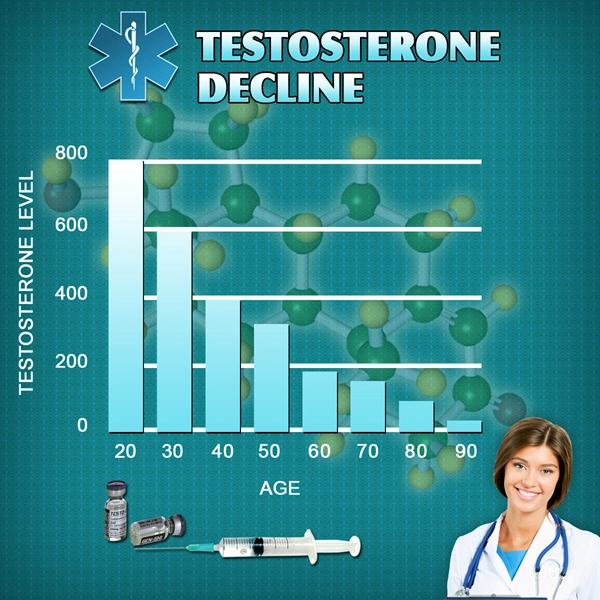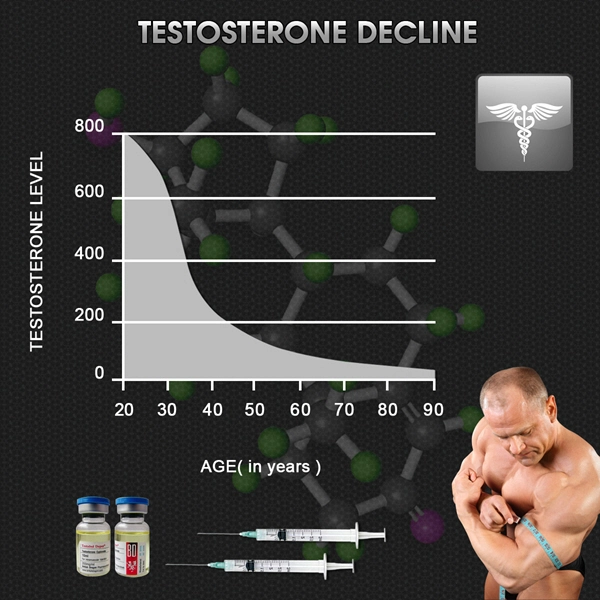Introduction to Testosterone Propionate
Testosterone propionate is a synthetic form of the primary male sex hormone, testosterone, commonly used in hormone replacement therapy (HRT) among American men. As a short-acting ester of testosterone, it is favored for its ability to quickly raise testosterone levels, making it a valuable tool in managing hypogonadism and related conditions.
The Mechanism of Action
Testosterone propionate works by supplementing the body's natural testosterone production. Once injected, it is rapidly absorbed into the bloodstream, where it exerts its effects by binding to androgen receptors in various tissues. This binding influences a range of physiological processes, including muscle growth, bone density, libido, and mood regulation.
Indications for Use
In American men, testosterone propionate is primarily indicated for the treatment of hypogonadism, a condition characterized by low testosterone levels. Symptoms of hypogonadism can include decreased libido, erectile dysfunction, fatigue, and loss of muscle mass. By restoring testosterone levels, testosterone propionate can significantly improve these symptoms, enhancing overall quality of life.
Administration and Dosage
Testosterone propionate is administered via intramuscular injection, typically into the gluteal muscle. Due to its short half-life, injections are usually required every two to three days to maintain stable testosterone levels. The dosage varies based on individual needs and response to treatment, but it generally ranges from 50 to 100 mg per injection.
Benefits of Testosterone Propionate
The primary benefit of testosterone propionate is its rapid onset of action, which allows for quick symptom relief in men with low testosterone. Additionally, its short half-life enables more precise control over hormone levels, which can be advantageous for patients requiring frequent adjustments to their therapy.
Potential Side Effects
While testosterone propionate can be highly effective, it is not without potential side effects. Common side effects include acne, fluid retention, and mood swings. More serious risks include an increased chance of cardiovascular events and the potential for liver toxicity, particularly with long-term use. Regular monitoring by a healthcare provider is essential to manage these risks effectively.
Monitoring and Follow-Up
Regular follow-up appointments are crucial when using testosterone propionate. Blood tests to monitor testosterone levels, liver function, and other relevant markers should be conducted periodically. Additionally, patients should be monitored for signs of cardiovascular disease and other potential complications.
Comparison with Other Testosterone Formulations
Testosterone propionate is just one of several testosterone formulations available for HRT. Compared to longer-acting esters like testosterone cypionate or enanthate, testosterone propionate requires more frequent dosing but offers more immediate and controllable effects. The choice of formulation depends on the patient's specific needs, lifestyle, and response to treatment.
Conclusion
Testosterone propionate plays a vital role in hormone replacement therapy for American men, offering a rapid and effective solution for those suffering from low testosterone levels. While it presents certain risks, these can be managed with careful monitoring and appropriate medical oversight. As with any medical treatment, it is essential for patients to work closely with their healthcare providers to ensure the safest and most effective use of testosterone propionate.
References
1. Bhasin, S., et al. (2018). "Testosterone Therapy in Men with Hypogonadism: An Endocrine Society Clinical Practice Guideline." *The Journal of Clinical Endocrinology & Metabolism*, 103(5), 1715-1744.
2. Snyder, P. J., et al. (2016). "Effects of Testosterone Treatment in Older Men." *The New England Journal of Medicine*, 374(7), 611-624.
3. Rhoden, E. L., & Morgentaler, A. (2004). "Risks of Testosterone-Replacement Therapy and Recommendations for Monitoring." *The New England Journal of Medicine*, 350(5), 482-492.

- Testosterone Propionate: Enhancing Hormonal Health in American Males [Last Updated On: March 11th, 2025] [Originally Added On: March 11th, 2025]
- Testosterone Propionate's Impact on Cognitive Function in American Males: A Review [Last Updated On: March 17th, 2025] [Originally Added On: March 17th, 2025]
- Testosterone Propionate: Enhancing Sleep Quality in U.S. Males - Mechanisms and Implications [Last Updated On: March 18th, 2025] [Originally Added On: March 18th, 2025]
- Testosterone Propionate: Benefits, Risks, and Use in American Men's Health and Fitness [Last Updated On: March 18th, 2025] [Originally Added On: March 18th, 2025]
- Testosterone Propionate: A Promising Treatment for Depression in American Males [Last Updated On: March 18th, 2025] [Originally Added On: March 18th, 2025]
- Testosterone Propionate: Enhancing Energy in American Men with Low Testosterone [Last Updated On: March 19th, 2025] [Originally Added On: March 19th, 2025]
- Testosterone Propionate's Role in Male Pattern Baldness Among American Men [Last Updated On: March 19th, 2025] [Originally Added On: March 19th, 2025]
- Testosterone Propionate: Efficacy in Weight Management for U.S. Males [Last Updated On: March 20th, 2025] [Originally Added On: March 20th, 2025]
- Testosterone Propionate: Uses, Effects, and Fertility Implications in American Males [Last Updated On: March 20th, 2025] [Originally Added On: March 20th, 2025]
- Testosterone Propionate: A Promising Treatment for Chronic Pain in American Males [Last Updated On: March 21st, 2025] [Originally Added On: March 21st, 2025]
- Testosterone Propionate: Enhancing Male Aesthetics in the US - Benefits and Risks [Last Updated On: March 22nd, 2025] [Originally Added On: March 22nd, 2025]
- Testosterone Propionate in American Sports: Ethics, Health Risks, and Regulatory Compliance [Last Updated On: March 22nd, 2025] [Originally Added On: March 22nd, 2025]
- Long-term Testosterone Propionate Use: Health Risks for American Men [Last Updated On: March 22nd, 2025] [Originally Added On: March 22nd, 2025]
- Testosterone Propionate's Impact on Immune Function in American Males: Risks and Insights [Last Updated On: March 22nd, 2025] [Originally Added On: March 22nd, 2025]
- Testosterone Propionate: A Targeted Therapy for Anemia in American Men with Hypogonadism [Last Updated On: March 22nd, 2025] [Originally Added On: March 22nd, 2025]
- Testosterone Propionate: A Promising Treatment for Low Sperm Count in American Males [Last Updated On: March 23rd, 2025] [Originally Added On: March 23rd, 2025]
- Testosterone Propionate: Benefits, Risks, and Use in American Male Bodybuilding [Last Updated On: March 23rd, 2025] [Originally Added On: March 23rd, 2025]
- Testosterone Propionate: Enhancing Endurance in American Men - Benefits and Risks [Last Updated On: March 23rd, 2025] [Originally Added On: March 23rd, 2025]
- Testosterone Propionate: A Promising Treatment for Osteoporosis in American Men [Last Updated On: March 23rd, 2025] [Originally Added On: March 23rd, 2025]
- Testosterone Propionate: Rapid Action HRT for Hypogonadism in American Males [Last Updated On: March 24th, 2025] [Originally Added On: March 24th, 2025]
- Testosterone Propionate: Liver Health Risks and Monitoring for American Males [Last Updated On: March 24th, 2025] [Originally Added On: March 24th, 2025]
- Testosterone Propionate's Impact on Mental Health in American Men: Risks and Benefits [Last Updated On: March 24th, 2025] [Originally Added On: March 24th, 2025]
- Testosterone Propionate: Managing Stress and Enhancing Mental Health in American Men [Last Updated On: March 24th, 2025] [Originally Added On: March 24th, 2025]
- Testosterone Propionate: Enhancing Vitality and Health in American Men [Last Updated On: March 25th, 2025] [Originally Added On: March 25th, 2025]
- Testosterone Propionate: Enhancing Fitness and Health in American Men [Last Updated On: March 25th, 2025] [Originally Added On: March 25th, 2025]
- Testosterone Propionate: Enhancing Muscle Recovery in American Men [Last Updated On: March 25th, 2025] [Originally Added On: March 25th, 2025]
- Testosterone Propionate: A Promising Tool in Managing Obesity in American Males [Last Updated On: March 25th, 2025] [Originally Added On: March 25th, 2025]
- Testosterone Propionate's Impact on Cholesterol Profiles in American Men: Cardiovascular Risks [Last Updated On: March 25th, 2025] [Originally Added On: March 25th, 2025]
- Testosterone Propionate: Enhancing Mood Stability in American Men - Benefits and Risks [Last Updated On: March 25th, 2025] [Originally Added On: March 25th, 2025]
- Testosterone Propionate's Impact on Diabetes Risk in American Males: A Comprehensive Analysis [Last Updated On: March 25th, 2025] [Originally Added On: March 25th, 2025]
- Testosterone Propionate in Anti-Aging: Benefits, Risks, and Personalized Use [Last Updated On: March 25th, 2025] [Originally Added On: March 25th, 2025]
- Testosterone Propionate: Benefits, Risks, and Usage for American Male Athletes [Last Updated On: March 26th, 2025] [Originally Added On: March 26th, 2025]
- Testosterone Propionate: Rapid Action Hormone Therapy for Hypogonadism in American Men [Last Updated On: March 26th, 2025] [Originally Added On: March 26th, 2025]
- Testosterone Propionate's Impact on Blood Pressure in American Men: A Comprehensive Analysis [Last Updated On: March 26th, 2025] [Originally Added On: March 26th, 2025]
- Testosterone Propionate: Benefits and Risks for American Men's Hormonal Health [Last Updated On: March 26th, 2025] [Originally Added On: March 26th, 2025]
- Testosterone Propionate's Impact on Cardiovascular Health in American Men: A Detailed Analysis [Last Updated On: March 26th, 2025] [Originally Added On: March 26th, 2025]
- Testosterone Propionate: Enhancing Bone Health in American Men with Hypogonadism [Last Updated On: March 26th, 2025] [Originally Added On: March 26th, 2025]
- Testosterone Propionate: Benefits, Risks, and Medical Supervision for American Men's Sexual Health [Last Updated On: March 26th, 2025] [Originally Added On: March 26th, 2025]
- Testosterone Propionate: Enhancing Strength and Performance in American Men [Last Updated On: March 27th, 2025] [Originally Added On: March 27th, 2025]
- Testosterone Propionate: Benefits, Risks, and Legalities for American Men's Muscle Building [Last Updated On: March 27th, 2025] [Originally Added On: March 27th, 2025]
- Testosterone Propionate: Enhancing Libido and Sexual Performance in American Men [Last Updated On: March 27th, 2025] [Originally Added On: March 27th, 2025]
- Testosterone Propionate's Impact on Immune System in American Men: A Comprehensive Review [Last Updated On: March 27th, 2025] [Originally Added On: March 27th, 2025]
- Testosterone Propionate: Enhancing Joint Health in American Men [Last Updated On: March 27th, 2025] [Originally Added On: March 27th, 2025]
- Testosterone Propionate: A Promising Treatment for Chronic Fatigue in American Men [Last Updated On: March 27th, 2025] [Originally Added On: March 27th, 2025]
- Testosterone Propionate: Cardiovascular Effects and Risks in American Men [Last Updated On: March 28th, 2025] [Originally Added On: March 28th, 2025]
- Testosterone Propionate: A Key Treatment for Muscle Wasting in American Males [Last Updated On: March 28th, 2025] [Originally Added On: March 28th, 2025]
- Testosterone Propionate: Enhancing Sexual Function in American Men with Hypogonadism [Last Updated On: March 28th, 2025] [Originally Added On: March 28th, 2025]
- Testosterone Propionate: Enhancing Performance in American Weightlifting [Last Updated On: March 28th, 2025] [Originally Added On: March 28th, 2025]
- Testosterone Propionate: Boosting Energy in American Males with Low Testosterone [Last Updated On: March 29th, 2025] [Originally Added On: March 29th, 2025]
- Testosterone Propionate's Impact on American Men's Mental Health: Mood, Cognition, Risks [Last Updated On: March 29th, 2025] [Originally Added On: March 29th, 2025]
- Testosterone Propionate: Enhancing American Men's Health and Well-being [Last Updated On: March 29th, 2025] [Originally Added On: March 29th, 2025]
- Testosterone Propionate: Enhancing Sexual Health and Performance in American Men [Last Updated On: March 30th, 2025] [Originally Added On: March 30th, 2025]
- Testosterone Propionate: Enhancing Emotional Health in American Men [Last Updated On: April 1st, 2025] [Originally Added On: April 1st, 2025]
- Testosterone Propionate in American Sports: Benefits, Risks, and Ethical Dilemmas [Last Updated On: April 1st, 2025] [Originally Added On: April 1st, 2025]
- Testosterone Propionate's Impact on Bone Health in American Men: A Comprehensive Review [Last Updated On: April 4th, 2025] [Originally Added On: April 4th, 2025]
- Testosterone Propionate: Enhancing Muscle Strength in American Men - Benefits and Risks [Last Updated On: April 7th, 2025] [Originally Added On: April 7th, 2025]
- Testosterone Propionate: Enhancing Sexual Desire and Function in American Men [Last Updated On: April 8th, 2025] [Originally Added On: April 8th, 2025]
- Testosterone Propionate: A Vital Therapy for Muscle Loss in American Males [Last Updated On: April 8th, 2025] [Originally Added On: April 8th, 2025]
- Testosterone Propionate: A Promising Treatment for Fatigue in American Males [Last Updated On: April 8th, 2025] [Originally Added On: April 8th, 2025]
- Testosterone Propionate: Uses, Benefits, and Risks in Medicine and Sports [Last Updated On: April 9th, 2025] [Originally Added On: April 9th, 2025]
- Testosterone Propionate: Benefits, Risks, and Legal Considerations for American Strength Trainers [Last Updated On: April 10th, 2025] [Originally Added On: April 10th, 2025]
- Testosterone Propionate: Benefits, Risks, and Ethics in Sports Performance Enhancement [Last Updated On: April 10th, 2025] [Originally Added On: April 10th, 2025]
- Testosterone Propionate: Enhancing Mood and Cognition in American Men [Last Updated On: April 11th, 2025] [Originally Added On: April 11th, 2025]
- Testosterone Propionate: Impacts on Male Reproductive Health and Risks [Last Updated On: April 12th, 2025] [Originally Added On: April 12th, 2025]
- Testosterone Propionate's Impact on Cardiovascular Health in American Men: Risks and Benefits [Last Updated On: April 13th, 2025] [Originally Added On: April 13th, 2025]
- Testosterone Propionate: Enhancing Endocrine Health in American Men [Last Updated On: April 13th, 2025] [Originally Added On: April 13th, 2025]



List of USA state clinics - click a flag below for blood testing clinics.
Word Count: 556



















































